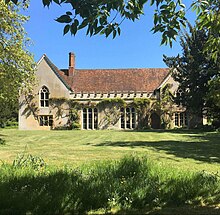Fred Blum
notability. (July 2020) ) |
This article needs additional citations for verification. (July 2020) |

Fred Johannes Blum (1914 – 1990) was an American
Blum was born 1914 in
Life
Blum became a member of the
In 1969, Blum met Bishop Stephen Verney at a conference in Coventry where Verney was doing reconciliation work. They became friends, “like brothers”, and Verney became a trustee and significant supporter and contributor to the creation and work of The New Era Centre at The Abbey, which became a registered charity on 20 December 1979. Verney was a well-connected individual, and frequently communicated with the politician Roy Jenkins.[3] The residential community of The New Era Centre in The Abbey was dedicated on 4 October 1981 as a space to explore and work towards the synthesis of Christianity and more contemporary understandings of societal transformation. In 1984, after The Abbey was improved to a habitable state, the first two resident community members moved in. Stephen Verney extensively discussed, and believed in, the role Buddhist practice and philosophy could play in increasing connectivity with a Christian deity, and it was this belief which led many of The New Era Centre's early pursuits.[3]

In 1978, David Astor sold The Abbey, Sutton Courtenay and after ownership by property developers it was sold in 1980 to The New Era Centre.[4] Twentieth-century landowners had to contend with various states of disrepair, and few have had either the capital or the will to sustain the business. Upon the purchase of The Abbey by The New Era Centre in 1980, a monumental effort was required to source volunteer labour, both locally and from abroad. Sourcing funding was difficult, and some potential investors remained unconvinced that the founders high ideals could lead to anything other than a misuse of funds. However, Blum and Verney remained committed to their project. Much of the work was carried out in a co-operative form, such as the 'work camp' of 1981, a community of enthusiastic volunteers. Volunteers from organisations such as WWOOF UK and HelpX still play a vital role in keeping The Abbey alive.[5] In August 1991, the charity was renamed 'The Abbey, Sutton Courtenay'.
Blum spent decades researching, interviewing and publishing on Mahatma Gandhi's life works and legacy. He led the "Gandhi Interview Project" in the 1970s and early 80s.[6] Much of Blum's work can now be found in The Abbey's library.[1]
In 1986, Blum decided to be baptised into the
Selected works
- Work and Community (Routledge Kegan Paul, 1968)
- The Ethics of Industrial Man (Routledge 1970)
References
- ^ a b c d e "The Abbey's Founders". The Abbey, Sutton Courtenay. Retrieved 20 March 2020.
- ^ Mehta 2011, p. 56.
- ^ a b The Abbey, Sutton Courtenay archives.
- ^ Mehta 2011, p. 58.
- ^ "Volunteering". The Abbey, Sutton Courtenay. 2020. Retrieved 20 March 2020.
- ^ Mehta 2011, p. 57.
Bibliography
- Mehta, Jayshree; ISBN 9788132105572.
